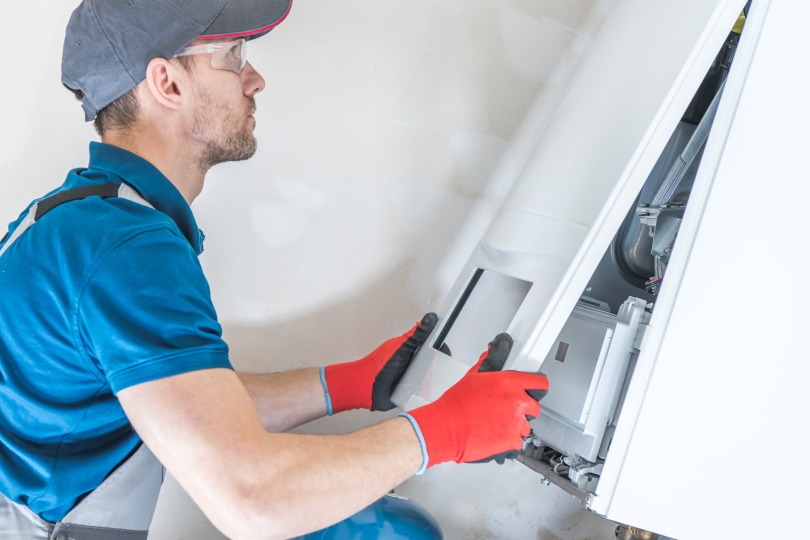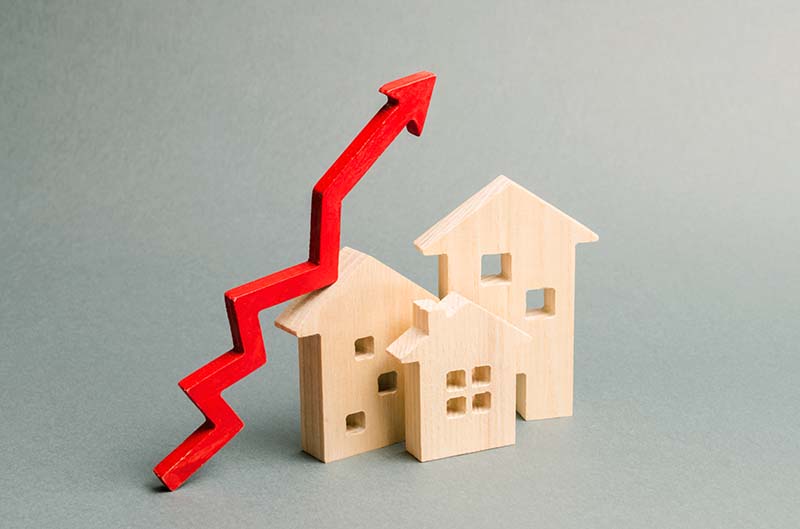How Do Home Appraisals Work? What To Consider
-
Pete Ortiz
- Last updated:

Let’s say you want to buy a new house: how do you know the price isn’t too high? Or maybe you’re trying to sell your own property: can you figure out its market value? Unless you’re a seasoned real estate agent, it will take weeks or even months of research to find the answers. So, how about letting a pro handle the inspection? Yes, we’re talking about a home appraisal made by a licensed agent.
They’ll help determine the real value of the property by assessing the square footage, number of rooms, physical condition, and amenities. Without an appraisal, you’ll end up paying more for a house (as the buyer) or selling it at a lower price (as the owner). But how exactly do home appraisals work? How much do they cost? Are they mandatory? Let’s find out!
How Does It Work?
The main job of a home appraiser is to assess the value of a property by comparing its worth to that of comparable sales in the area. A licensed appraiser is often hired when a person is trying to refinance a mortgage or get a loan to buy a new house. On average, an experienced professional takes 1–2 hours to get the job done, or even less. It all starts with the lender ordering an appraisal. Once you transfer the funds, the expert will pay a visit.
That’s right—the company won’t cover the expenses. Appraisers make notes on the area, square footage, and amenities of the property. When they’re done, you’ll receive a detailed report with a fair market value for the dwelling. The final stage is when the lender approves or denies the loan. If the appraised value is lower than the selling price, most likely, you won’t get a loan. It needs to match (or be higher than) the agreed-upon price.

And here’s a quick look at what appraisers check in a property:
- Asking price of comparable homes in the area
- Neighborhood characteristics and market trends
- Square footage (how big is the house)
- How old is the house? What’s it made of?
- The physical and structural condition of the house
- Signs of water damage and pest infestation
- How many rooms/bedrooms are in the house?
- How many bathrooms does the house have?
- The property (landscaping, how clean everything is)
- Are there any amenities like a pool or a built-in bar?
What Are the Different Types of Appraisals?
Back in the day, in-person appraisals were the only option on the table. Today, there are four different kinds of property assessment. Now, if you applied for a mortgage loan, the lender would choose the appraisal type—you won’t have to worry about any of that. Still, it’s important to know what you can expect when dealing with a certified home appraiser:
- In-Person Visits – This is the oldest and most used type of appraisal. Once you set a date, the company sends a licensed professional to the house so that they can check everything on sight. They’ll inspect the size, condition, and physical location of the house and compare it to recently sold properties that match its portfolio. These visits allow the appraiser to conduct a 360-degree evaluation.
- Desktop/1007 Appraisals – Real estate analysts don’t have to be physically present to appraise a property. They can access public records and compare the price of the house in question to recently sold homes to figure out its true worth. The biggest pro of this approach is that the company will be able to have a full report on short notice.
- Hybrid Appraisals – As the name suggests, a hybrid appraisal is a combination of remote and on-site inspections. The appraiser will do most of the work by looking at photos of the listed house. Next, they’ll ask local talent to evaluate the property “on foot”: check the number of rooms/bathrooms, measure the size of the house, and collect any other info that the appraiser requires.
- Drive-by Appraisals – These types of appraisals have never been popular before, but that all changed after COVID-19. During a drive-by appraisal, the specialists only look at the exterior of the house and never go in. When the pandemic hit, many VA and FHA lenders in the US started using this option to get at least an estimated value.

Where Is It Used?
Home appraisals are used in three cases. First, if you’re looking to buy a house and want to get a proper evaluation of its current value, a third-party appraiser will be able to do that for you. The same applies if you’re the seller and want to put the house for sale. Having your property appraised before the buyers line up is a good way of knowing roughly how much a potential client will pay for it. Appraisals also help when you’re trying to refinance.
That pretty much covers it. Now, home appraisals don’t require the buyer or the seller to be present during the evaluation. Still, we encourage you to find time and join the appraiser. It’s always better to talk to them in person instead of looking at a report on a piece of paper. It’s also worth mentioning that the appraiser has to come from a third party and have no ties to the seller, potential buyer, or the mortgage company offering a loan.
Preparing for an Appraisal
If you’re the buyer, you don’t have to do much as long as you’re happy with the asking price and are ready to communicate. Just wait for the appraiser to check everything and hit you back with a report. In contrast, as a seller, you must get everything ready before the “hunting party” arrives at your property. These steps will help get things in order and present the house in the best light:
- Consult with a real estate agent – The first thing you should do is ask a real estate agent to give the dwelling a quick look. They’ll tell you about the things that might bother an appraiser and how to fix them. Also, take a moment to do some of your own research. The info on recently sold houses is public knowledge. Having a hard time making sense of it? The real estate agent will help with that as well.
- Check the critical systems – Ideally, when the appraiser steps foot into the house, the HVAC system should be on. The same is true for smoke/carbon monoxide detectors and any other safety systems installed on the property. Next, replace the burned-out bulbs. This will give the appraiser a good first impression, which is exactly what we’re going for here.
- Make small repairs – It’s not rare for buyers to ask the seller to pay for some repairs before sealing the deal—that’s a normal part of the process. However, if you don’t have an interested buyer just yet, focus instead on making the house look presentable. We’re talking about painting the walls, fixing the furniture, and getting rid of the garbage from the yard.
- Consider deep cleaning the place – A bit nervous about selling the house? Well, you’ll be able to improve your chances by making the rooms feel bigger (kiss unnecessary furniture goodbye) and lighter (try hanging some mirrors around the house). To make the house cozy, remove the dust, fix the cabinets, and clean the countertops in the kitchen. Some plants here and there won’t hurt, either.

Advantages of Appraisals
- Determine the true value of a property – If you know nothing about the housing market and how it works, you’ll be overwhelmed by all the little factors that affect the price. On the bright side, a home appraiser will be able to give you an unbiased, professional opinion on the market value of the house. The prices go up and down all the time, but the experts can get the best deal.
- Help sell or buy a home at a better price – This is the biggest reason why people consider hiring a home appraiser in the first place. Without their help, you’ll run the risk of paying more or getting less for the same property (as the homeowner).
- Make it possible to get a loan – Mortgage lenders want to make sure you’re not getting scammed (or just paying more) when giving you a loan. That’s why they won’t provide any financial support unless you agree to pay for a home appraisal. This might sound a bit harsh, but appraisals aren’t very expensive (learn more about that in the FAQ).
- Doesn’t take very long to complete – A seasoned home appraiser will be able to complete the evaluation in a couple of hours. And if they’ve already done most of the work back at the office, it will only take them 20–30 minutes to appraise the property when they arrive at the address. The same goes for home inspections.
Disadvantages of Appraisals
- Takes a while if the house is big – Rushing things is the last thing you want to do when buying/selling a house. It’s important to be patient and let the pros do their job. That said, although most home appraisals are, indeed, done within hours, if the property is bigger than average and has many “interest points” for the appraiser, the process can take much longer.
- Only offer basic condition evaluation – Home appraisers do, of course, check both the exterior and the interior of the house. They also take a quick look at the cabinets, doors, basement, and attic while making sure the HVAC, plumbing, and other systems are working smoothly. However, they’re not nearly as thorough as home inspectors. So, if you want to learn about the condition of the house, an appraisal won’t be able to provide a detailed report.
Frequently Asked Questions (FAQs)
Are Home Appraisals Mandatory?
This depends on whether you’re planning on buying or selling a home. When the goal is to put up a property you own for sale, an appraisal is highly recommended, yet not obligated. In contrast, if you’re trying to buy a new home and you’re asking a mortgage company for a loan, the lender will order a home appraisal. This is done so that the company knows the current value of that property and doesn’t pay more than it should.
An appraisal won’t be necessary when paying in full in cash, though. Still, it would be great to save up a bit for a professional appraiser, even if you’re on a tight budget. The reason: they’ll help strike a better deal that will instantly cover the appraiser’s compensation and then some. Now, since 2019, houses that cost less than $400,000 don’t require an appraisal, but this only applies to specific scenarios.

How Much Does an Appraisal Cost?
In the US, the national average for a home appraisal is $310–$420, with most homeowners and sellers paying $350 for the service. The actual price depends on the size, complexity, and location of the property. The overall condition (older dwellings with construction issues take more time and effort to evaluate) and the time of the year (the fees are higher in winter) also matter.
For example, if you request an appraisal for a multifamily home in a busy area, they may charge up to $1,500. In contrast, a smaller single-family home will only cost $250–$300 to appraise. So, before you sign anything, get some quotes from local real estate companies. But, considering how expensive housing in the US is today, appraisals don’t cost that much.
Appraisal vs Inspection: What’s the Difference?
A home appraisal is a thorough evaluation of a property. The appraisal agent determines the value by comparing it to similar homes in the area. An inspection, in turn, focuses on the physical condition of the dwelling. These two terms are often used interchangeably; however, they are quite different. Roughly, home inspections cost the same as appraisals.

While an appraisal’s purpose is to reveal the value of the home, an inspection is all about understanding what condition it’s in. Inspectors check the heating, pumping, electrical, and air systems. Next, they move on to the attic and the basement and set eyes on every corner of the property. In contrast to appraisals, inspections are rarely required by mortgage lenders.
- You want to get the best deal on a new property
- You’re trying to sell your own house
- The mortgage lender is requesting it
- The home prices in the area vary a lot
- You’re happy with the seller’s price and are willing to pay in cash
- You’re more interested in an inspection
- The deal doesn’t involve any loans
- The home is valued at $400,000 or lower
 Conclusion
Conclusion
It doesn’t matter whether you’re trying to buy or sell a house. If you want to get the best offer, you’ll need a professional appraiser to determine the home’s value. Thankfully, property evaluation doesn’t cost a fortune, and most real estate appraisers will have a report ready for you in an hour or two. Besides, mortgage companies often request an appraisal to approve a loan.
Now, while it’s the real estate agents who do the heavy lifting, a home appraisal can be a bit stressful both for the homeowner and the potential buyer. So, it might be wise to talk to a real estate agent, get a scope on things, and bring everything in order before the appraiser arrives for the assessment.
- Appraisal Threshold Increase to $400K
- Why Do Mortgage Lenders Want an Appraisal?
- What Is A Home Appraisal?
- How Much Does An Appraisal Cost?
- Home Appraisal Vs. Home Inspection
- Home Appraisal Guide
- How To Prepare For A Home Appraisal
- How Home Appraisals Work
- What Does An Appraiser Do?
- Home Appraisal Tips
- What Do Appraisers Look For?
Featured Image Credit: todd kent, Unsplash
Contents


